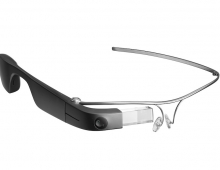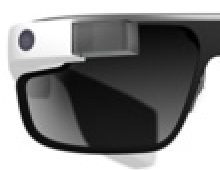
Facebook And Twitter Jump on Google Glass
Facebook and Twitter are coming to Google Glass wearable computer, Google announced at Google I/O, but the company is already facing questions from Congress over privacy concerns.
With Twitter for Google Glass, you can share photos to Twitter. The Tweet will automatically include the text, "Just shared a photo #throughglass", as you can see here:

In addition to sharing photos, you can also keep up with the people you follow on Twitter through notifications - for mentions, DMs and Tweets from users for whom you've turned on notifications. As always, you can reply to, retweet or favorite these Tweets.
If you have Glass and want to start using Twitter, go to google.com/myglass and turn on Twitter.
With Facebook for Google Glass, you can share photos you take directly from Google Glass to Facebook. First you'll have to enable Facebook for Glass in your "MyGlass page," set up sharing contacts and that's it. You can also add a description to a photo after you've shared it to Facebook.
Google also even more apps specially designed to work on its Glass devices. News network CNN, fashion magazine Elle, as well as online apps Tumblr and Evernote were among the new apps for Glass. Developers at eBay are also working on potential applications for Google Glass, Reuters reported earlier today.

Glass lets wearers take pictures, record video, send messages, or perform other tasks with touch controls or by speaking "Okay Glass" followed by a command. The device connects to the Internet using Wi-Fi hot spots or by being wirelessly tethered to mobile phones.

Google began distributing the devices last month to a limited number of developers. The company has not specified when a version will be available for consumers or at what price.
However, Google is facing tough questions from Congress over the privacy concerns raised by Glass. On Thursday members of a U.S. congressional group on privacy wrote a letter to Google CEO Larry Page requesting information on how the device handles privacy issues. Their questions focus on whether Glass will be able to use facial recognition technology to reveal personal information about people, or whether users would be able to request that information. The Representatives want answers to their questions by June 14.
"We are thinking very carefully about how we design Glass because new technology always raises new concerns," the company said in a statement.
Google has set developer policies for Glass.
"Don't collect, store or share sensitive personal information such as credit card, bank account, driver's license or Social Security numbers, except as necessary to collect payment," the company says to developers.
Also, "Don't use users' personal information for purposes beyond the limited and express purpose of your application, without getting specific opt-in consent from the user," the policy states.

In addition to sharing photos, you can also keep up with the people you follow on Twitter through notifications - for mentions, DMs and Tweets from users for whom you've turned on notifications. As always, you can reply to, retweet or favorite these Tweets.
If you have Glass and want to start using Twitter, go to google.com/myglass and turn on Twitter.
With Facebook for Google Glass, you can share photos you take directly from Google Glass to Facebook. First you'll have to enable Facebook for Glass in your "MyGlass page," set up sharing contacts and that's it. You can also add a description to a photo after you've shared it to Facebook.
Google also even more apps specially designed to work on its Glass devices. News network CNN, fashion magazine Elle, as well as online apps Tumblr and Evernote were among the new apps for Glass. Developers at eBay are also working on potential applications for Google Glass, Reuters reported earlier today.

Glass lets wearers take pictures, record video, send messages, or perform other tasks with touch controls or by speaking "Okay Glass" followed by a command. The device connects to the Internet using Wi-Fi hot spots or by being wirelessly tethered to mobile phones.

Google began distributing the devices last month to a limited number of developers. The company has not specified when a version will be available for consumers or at what price.
However, Google is facing tough questions from Congress over the privacy concerns raised by Glass. On Thursday members of a U.S. congressional group on privacy wrote a letter to Google CEO Larry Page requesting information on how the device handles privacy issues. Their questions focus on whether Glass will be able to use facial recognition technology to reveal personal information about people, or whether users would be able to request that information. The Representatives want answers to their questions by June 14.
"We are thinking very carefully about how we design Glass because new technology always raises new concerns," the company said in a statement.
Google has set developer policies for Glass.
"Don't collect, store or share sensitive personal information such as credit card, bank account, driver's license or Social Security numbers, except as necessary to collect payment," the company says to developers.
Also, "Don't use users' personal information for purposes beyond the limited and express purpose of your application, without getting specific opt-in consent from the user," the policy states.





















